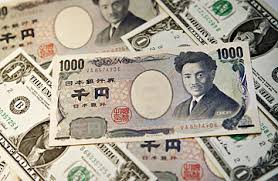By Masaki Kondo - Nov 30, 2012 10:47 AM GMT+0400
 Shinzo Abe, leader of Japan’s main opposition Liberal Democratic Party, today called for all needed measures to boost inflation to 2 percent. The dollar was near a one-month low against the euro as Democrats and Republicans wrangled over the spending cuts and tax increases of the so-called fiscal cliff looming for the U.S. in January.
Shinzo Abe, leader of Japan’s main opposition Liberal Democratic Party, today called for all needed measures to boost inflation to 2 percent. The dollar was near a one-month low against the euro as Democrats and Republicans wrangled over the spending cuts and tax increases of the so-called fiscal cliff looming for the U.S. in January.
The yen slid to a seven-month low versus the euro after data showed Japan’s consumer prices stagnated last month, fanning speculation the central bank will increase stimulus to spur inflation.
“Abe’s remarks are pulling down the yen,” said Kazuo Shirai, a trader at Union Bank NA in Los Angeles. “It’s a positive that both Republicans and Democrats are negotiating over the fiscal cliff.”
The yen reached 107.30 per euro, the weakest level since April 27, before trading at 107.16 as of 6:43 a.m. in London, 0.5 percent lower than the close in New York. It fell 0.4 percent to 82.42 per dollar. The greenback lost 0.2 percent to $1.3004 per euro after touching $1.3014 yesterday, the lowest since Oct. 31.
The MSCI Asia Pacific Index of shares rose 0.5 percent, sapping demand for lower-yielding, haven currencies.
Japan’s consumer prices excluding fresh food were unchanged in October from a year earlier after a 0.1 percent decline in September, the statistics bureau said in Tokyo today. The BOJ has an annual inflation target of 1 percent.
Japan’s Elections
Abe has called for the Bank of Japan (8301) to pump unlimited cash into the financial system and said today that monetary easing may include purchases of foreign bonds. Economy Minister Seiji Maehara said earlier that concern over Japan’s economy is increasing and that he wants to cooperate with the BOJ to end deflation.
Abe’s LDP had an approval rating of 23 percent, compared with 13 percent for the ruling Democratic Party of Japan, the Nikkei newspaper reported yesterday, citing a Nov. 26-28 opinion poll. The nation will hold elections on Dec. 16 for the lower house of parliament which determines who will be prime minister.
“The yen has already entered a weakening trend,” said Akira Moroga, manager of foreign-exchange products at Aozora Bank Ltd. (8304) in Tokyo. “There are many players out there who want to buy the dollar-yen.”
The yen has fallen 3.2 percent versus the dollar in November, poised for the biggest monthly decline since February. The euro has risen 0.3 percent.
Fiscal Cliff
U.S. Treasury Secretary Timothy Geithner offered Republican House Speaker John Boehner a proposal to avert an end-of-the- year fiscal cliff that would trade $1.6 trillion in tax increases for $400 billion in unspecified entitlement-program cuts, a Republican aide said, who wasn’t authorized to speak publicly.
After meeting Geithner yesterday, Boehner said President Barack Obama must “get serious” about the fiscal cliff talks. Senate Majority Leader Harry Reid, a Nevada Democrat, said Democrats need a proposal from Republicans on what sort of spending cuts they want.
The Dollar Index (DXY) fell 0.1 percent to 80.121, sliding for a third day. The gauge has reached the support zone of 80 to 79.65, which includes the 50 percent and 61.8 percent retracements from the Nov. 16 high to the Sept. 14 low, according to Niall O’Connor, a New York-based technical analyst with JPMorgan Chase & Co.
“Breaks here are necessary to confirm a deeper pullback and retest of the range lows,” the analyst wrote in a research note yesterday.
German Vote
German lawmakers will vote today to ratify an amended aid plan to Greece after euro-area finance ministers agreed to ease terms of emergency bailout loan for the debt-saddled nation.
“Germany should give parliamentary approvals to the new Greek debt deal later today which may also help sentiment towards the euro,” Ray Attrill, Sydney-based global co-head of currency strategy at National Australia Bank, wrote in a research note.
The one-year, 25-delta risk-reversal rate for the euro reached minus 1.2975 percent today, the highest since October 2010, signaling reduced demand for the right to sell the common currency against the dollar. It was at minus 3.3425 percent at the beginning of this year.
To contact the reporter on this story: Masaki Kondo in Singapore at mkondo3@bloomberg.net
To contact the editor responsible for this story: Rocky Swift at rswift5@bloomberg.net